What Is the Cheapest Crypto to Transfer? Send Crypto With Lowest Transaction Fees
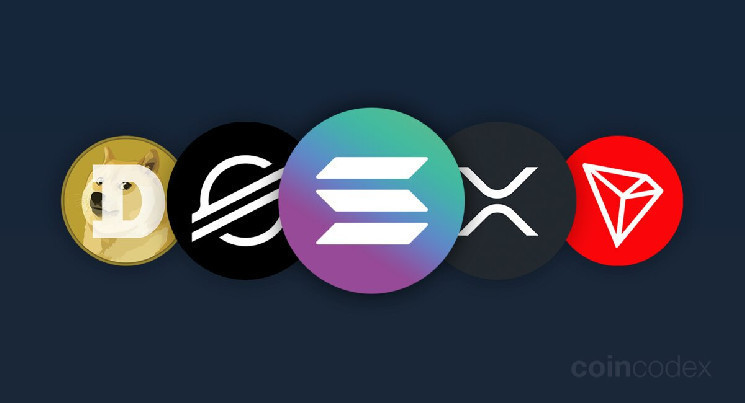
The blockchain technology can facilitate very low-cost transactions, with cryptocurrencies like Solana, XRP, Stellar, TRON, and several others allowing users to send significant amounts of money at near-zero fees.
Cryptocurrencies are a unique form of digital money that can be sent on a 24/7 basis anywhere in the world with practically no restrictions, as long as you pay the necessary transaction fee. It doesn’t matter if you’re sending crypto to your neighbor or to someone on the other side of the planet—the transaction fee will be the same.
While the freedom afforded by cryptocurrencies is certainly welcome, the most popular cryptocurrencies are not exactly cheap to use. Both Bitcoin and Ethereum are often criticized for their high transaction fees, as a single transaction on these networks can cost upwards of $20 during periods of intense network activity.
If you’re put off by the high transaction fees associated with using Bitcoin and Ethereum, that shouldn’t be a reason to give up on crypto. This is because there are plenty of cheaper alternatives available on the market.
Here is the list of cryptocurrencies with the cheapest transfer fees:
- Solana – A highly scalable platform for smart contracts
- XRP – An efficient cryptocurrency for payments
- Stellar – An efficient cryptocurrency for payments and decentralized trading
- Dogecoin – A meme coin with low transaction fees
- TRON – A smart contracts platform with low fees
- Litecoin – A more efficient alternative to Bitcoin
- Dash – A cryptocurrency focused on convenient digital payments
- Algorand – A highly efficient smart contracts platform
- Nano – A cryptocurrency with zero transaction fees
- Zcash – A private cryptocurrency with low transaction fees
- NEAR Protocol – A smart contracts platform with sharding technology
- Monero – The premier privacy coin
The 12 cheapest cryptos to transfer with close to zero transaction fees
In this article, we’ll examine 12 of the cheapest cryptos to transfer. These cryptocurrencies can be sent for just a couple of cents per transaction, or even less. Coins with low transaction fees are great for everyday payments, transferring value between different cryptocurrency exchanges and micropayments. Without further ado, let’s get started with the cheapest crypto to send.
1. Solana
Solana is a smart contracts platform with a unique architecture that allows it to process thousands of transactions per second while keeping costs extremely low. Solana achieves this by utilizing a unique Proof-of-History algorithm and a Proof-of-Stake consensus mechanism.
Solana was founded in 2018 by Anatoly Yakovenko. The platform’s mainnet launched in March 2020 and saw a huge boost in adoption in 2021. While SOL has lost a lot of its value in the 2022 bear market, Solana still has one of the most impressive ecosystems in the cryptocurrency sector.
Transactions on Solana only cost about $0.00025. This means that you can send SOL, custom SPL tokens, and NFTs at virtually no cost. So, if transaction fees are pricing you out of decentralized finance or NFT trading on Ethereum, Solana is definitely a blockchain worth considering. Among popular cryptocurrencies, Solana is one of the cryptos with the lowest fees and one of the most promising crypto projects for the long term.
Buy Solana Now
2. XRP
XRP is a cryptocurrency that was initially released in 2012, making it one of the most established crypto assets on the market today. XRP distinguished itself from Bitcoin by not utilizing Proof-of-Work, instead relying on the unique XRP Ledger Consensus Protocol. This consensus protocol allows XRP to process transactions quickly while charging extremely low fees.
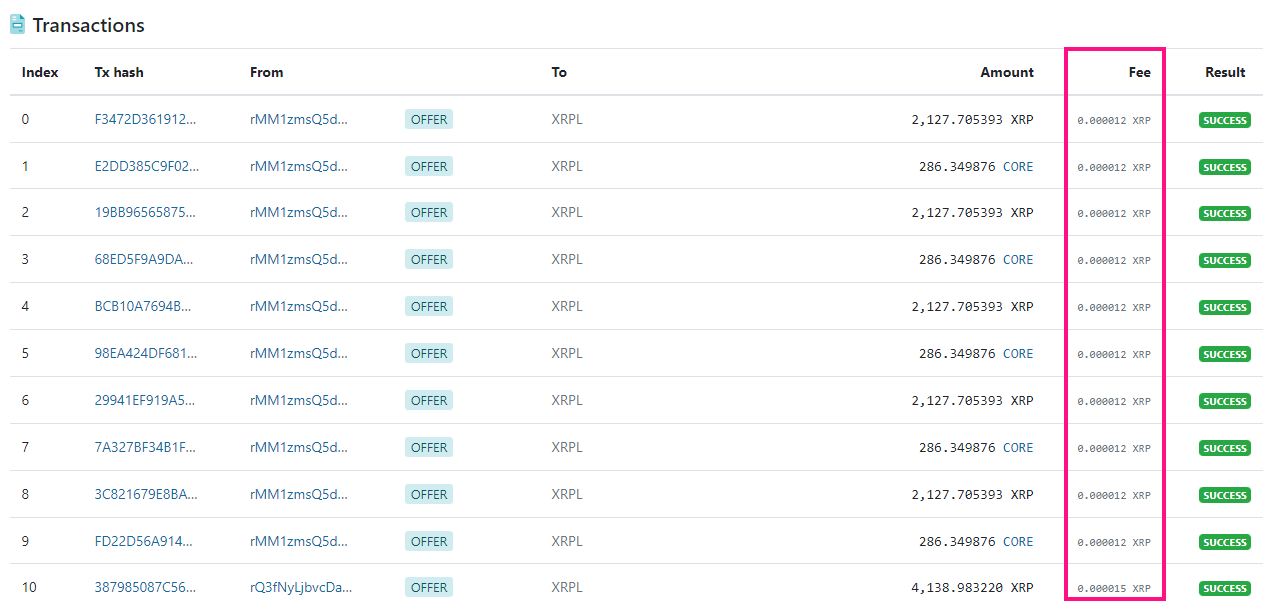
However, some members of the crypto community have criticized the XRP cryptocurrency for allegedly being insufficiently decentralized. This is because a large portion of the XRP supply is held by Ripple, a United States-based fintech company that utilizes XRP in its cross-border payments products. In the early days of XRP, Ripple was gifted 80 billion XRP (80% of the supply) by the XRP founders.
While the XRP cryptocurrency doesn’t offer smart contracts, it provides an extremely efficient way for simple transfers of value. This is why XRP is often used to move value from one cryptocurrency exchange to another.
Before you set up an XRP wallet, you have to keep in mind that each account on the XRP Ledger needs to have a reserve of at least 10 XRP before it can be used. This 10 XP reserve cannot be spent.
Buy XRP Now
3. Stellar
Stellar is a cryptocurrency that started off as an offshoot of XRP. The project was co-founded by Jed McCaleb, who was part of the trio that created XRP. The native asset of the Stellar blockchain is called lumens, and has the ticker symbol XLM. It implements a similar consensus algorithm to XRP, enabling cheap and fast transactions.
The minimum transaction fee on the Stellar blockchain is just 0.00001 XLM. This means that 1 XLM can theoretically pay for 100,000 transactions. In reality, users have to pay a slightly higher fee to have their transactions confirmed in a timely manner — a realistic figure is about 0.0001 XLM, which is still extremely low.
The Stellar blockchain can be used to efficiently trade different assets in a decentralized manner thanks to its built-in decentralized exchange functionality. You can access this functionality through interfaces such as StellarX, where you can trade XLM against various fiat currencies and crypto assets. Of course, you can also simply use XLM as a highly efficient digital currency for everyday transactions.
In 2022, the Stellar Foundation announced that they started developing smart contracts functionality for the Stellar blockchain. If it is implemented successfully, it could provide a big boost for the Stellar ecosystem.
Buy Stellar Now
4. Dogecoin
Dogecoin is a meme coin that was launched in 2013 and has remained a mainstay of the cryptocurrency market ever since. From a technical standpoint, Dogecoin is a fork of Litecoin, and it is also merge-mined alongside LTC.
Broadly speaking, Dogecoin provides similar functionality to Bitcoin. It is a decentralized peer-to-peer digital currency secured through Proof-of-Work (mining), that can be used to send transactions anywhere at any time.
While Dogecoin does not have the extreme level of security offered by Bitcoin, it does provide much cheaper transactions. At the time of writing, you can send DOGE for about $0.005 in fees. Transaction fees can vary significantly depending on how much demand there is for the Dogecoin network, but they have historically stayed under $1 most of the time.
During periods of low network activity, Dogecoin offers some of the lowest crypto transaction fees on the market. However, when there’s a lot of hype around DOGE, the network becomes less efficient to use.
Buy Dogecoin Now
5. TRON
TRON is a blockchain platform similar to Ethereum, which implements a Delegated Proof-of-Stake (DPoS) consensus mechanism. This makes it able to process transactions with very low costs.
Transaction fees on the TRON network are almost negligible compared to Ethereum, which has made it a popular platform for stablecoin transactions. More specifically, TRON is very commonly used to transact with the USDT stablecoin.
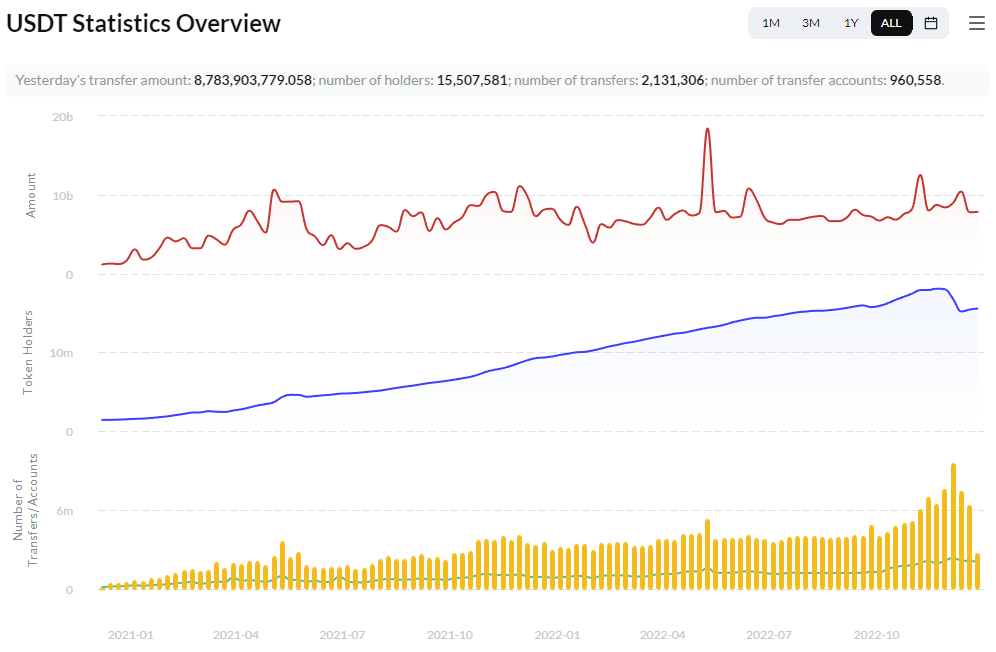
USDT usage on the TRON blockchain.
While the decentralized app ecosystem on TRON isn’t nearly as diverse as what you can find on Ethereum, TRON is still worth considering if you’re looking to get into DeFi and other on-chain activities without spending a fortune on transaction fees.
Buy Tron Now
6. Litecoin
Litecoin is a cryptocurrency that was launched in 2011 by Charlie Lee. It was one of the first altcoins on the market, and it has stayed relevant until today. In fact, it’s arguably one of the best cryptos to buy right now, thanks to its upcoming halving.
Litecoin is extremely similar to Bitcoin, although there are some key differences. Litecoin uses the Scrypt hashing algorithm instead of the SHA-256 algorithm utilized by Bitcoin. It also has four times faster block times than Bitcoin and a maximum supply that’s four times larger.
If you like the idea of Bitcoin but don’t want to spend a lot on transaction fees, Litecoin is definitely worth checking out. At the time of writing, sending LTC will set you back only a little more than one cent.
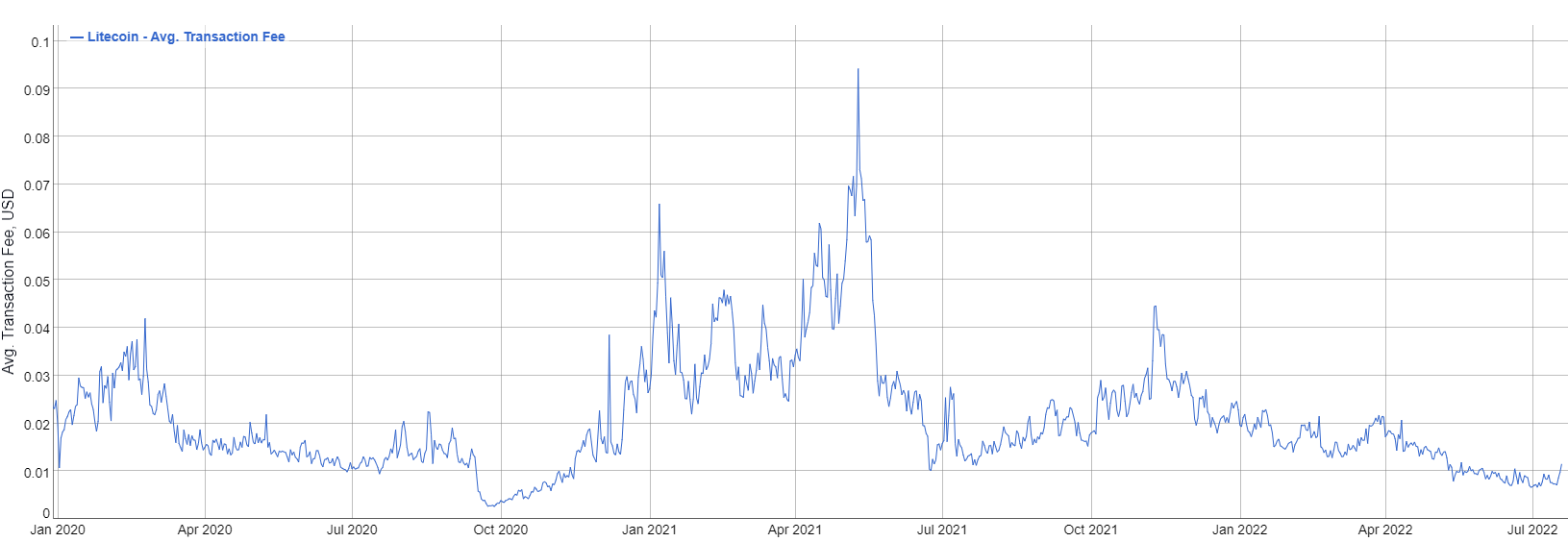
However, don’t expect any fancy smart contract features — Litecoin is a straightforward cryptocurrency that’s specialized for simple peer-to-peer transactions.
Still, Litecoin is a very interesting coin to consider in 2023, as we’re going to see the next Litecoin halving this year. Check out our video on the topic to learn more.
Buy Litecoin Now
7. Dash
Dash is a popular altcoin that was launched in early 2014. It utilizes a combination of Proof-of-Work mining and master nodes. The name Dash stands for “digital cash,” and the cryptocurrency is designed to be a convenient way of making payments.
Dash can also be considered a privacy coin, as its PrivateSend feature allows users to obfuscate the origins of their DASH coins to improve the privacy of a transaction on the Dash network. Dash also boasts InstantSend technology, in which transactions are verified by the Dash masternode network. Transactions sent through InstantSend are confirmed in seconds.
Dash transaction fees are very low, as you can usually send a DASH transaction for less than one cent in fees. So, if you want an efficient way of making crypto payments, it’s certainly worth taking a closer look at Dash.
Buy Dash Now
8. Algorand
Algorand is a blockchain platform for smart contracts that utilizes a Proof-of-Stake consensus algorithm. The Algorand project was founded in 2017 by Silvio Micali, a prominent computer scientist who has made significant contributions to the field of cryptography.
The Algorand mainnet went live in 2019 and has since been upgraded with improved smart contract capabilities, support for issuing custom tokens, and more. Algorand is designed to be an environmentally friendly and efficient blockchain and also offers low transaction fees.
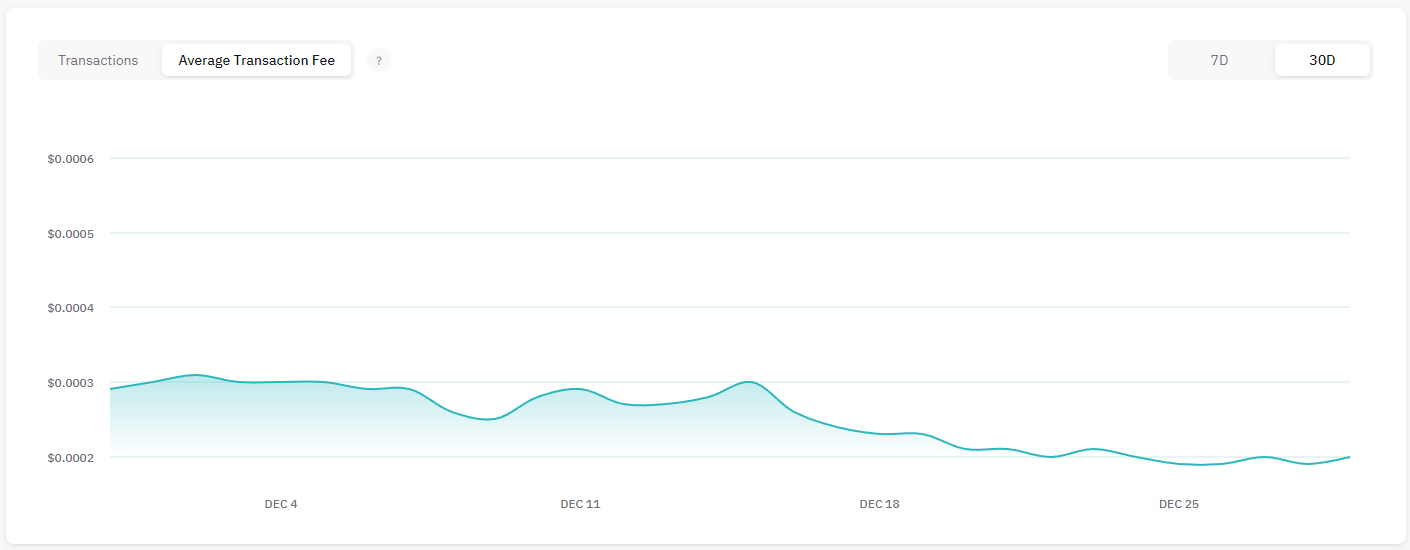
The minimum transaction fee on Algorand is 0.001 ALGO, which means that 1 ALGO can theoretically pay for 1,000 transactions. Algorand can be a great blockchain for users who want to start exploring use cases like NFTs and DeFi but don’t want to deal with the high transaction fees of Ethereum.
Buy Algorand Now
9. Nano
Nano is a cryptocurrency that launched in 2015 under the name RaiBlocks. Nano doesn’t implement any smart contract features but is instead hyper-focused on being as efficient as possible for simple payments.
The Nano blockchain has zero transaction fees. This is possible because of its unique architecture. Nano isn’t actually a blockchain, as it utilizes a DAG (directed acyclic graph) architecture.
While Nano is one of the fastest and cheapest cryptocurrencies available today, it has unfortunately seen limited adoption so far. The market capitalization of XNO, the native asset of the Nano blockchain, is only about $92 million at the time of writing. If you’re looking for a cryptocurrency with the lowest transaction fees, however, it’s difficult to beat Nano’s zero-fee design.
Buy Nano Now
10. Zcash
Zcash is a privacy-focused cryptocurrency that made its debut in 2016. While it is heavily inspired by Bitcoin in many aspects, Zcash implements innovative zero-knowledge technology that makes it possible to maintain complete privacy of transactions while proving that all transactions conform to the protocol’s rules.
Users who want to transact with ZEC can choose to send a transparent (public) or shielded (private) transaction. This is a unique feature compared to many other privacy coins, which usually only allow private transactions.
Zcash transaction fees are very low, although they have increased as of late. Still, you will only have to spend a couple of cents to send a transaction via the Zcash network. If you want to reduce your cryptocurrency transaction fees while protecting your financial privacy, Zcash is certainly among the best options to consider. In the future, Zcash will likely transition to Proof-of-Stake, which could make it even more efficient.
ECC objectives through Jan 2024 center on delivering an improved $ZEC user experience, primarily through the Zashi wallet.https://t.co/C9Z4RJaQdc
— Electric Coin Co. (@ElectricCoinCo) November 3, 2023
Buy Zcash Now
11. NEAR Protocol
NEAR Protocol is a layer 1 blockchain platform that implements a sharding mechanism called Nightshade and a Proof-of-Stake consensus algorithm. NEAR is designed to enable the mass adoption of web3 by offering strong scalability and developer-friendly features.
The NEAR project’s vision is to create an operating system for web3 that allows developers to create their apps in popular languages such as JavaScript and build their apps more efficiently by utilizing components created by community members. In addition, NEAR is capable of onboarding even users who don’t yet have any cryptocurrency, making it accessible to users who are engaging with web3 technologies for the first time.
On NEAR Protocol, transactions reach finality in less than three seconds and cost under $0.01 in fees. As the next phases of the Nightshade rollout are completed, we can expect NEAR to boast even more impressive scalability.
If you’re looking for an efficient smart contracts platform to explore, NEAR Protocol is a solid alternative to the more popular choices such as Solana and Polygon.
Buy NEAR Protocol Now
12. Monero
Monero is the largest privacy coin in terms of market capitalization – at the time of writing, XMR is ranked in 26th position among all cryptocurrencies thanks to a market cap of $2.98 billion.
Monero employs a variety of technologies to ensure that a transaction’s recipient and sender, as well as the amount of XMR that is involved, is not known to anyone that’s not participating in the transaction. These technologies include RingCT, stealth addresses, ring signatures and Tor/I2P support. Monero’s privacy-enabling tech allows XMR to be a truly fungible cryptocurrency, as specific XMR coins cannot be effectively tracked or blacklisted.
In addition to its strong privacy features, Monero is also quite cheap to transact with. In terms of USD value, Monero transactions typically cost less than 5 cents, except in periods of congestion. However, the average Monero transaction fee has not exceeded $0.35 at any point since 2020, according to BitInfoCharts.
Buy Monero Now
Transaction fee comparison
Let’s take a look at how the cryptocurrencies we have featured square up against each other. As you can see, all of them are inexpensive to use, with some having practically negligible transaction costs. Please note that the transaction fees and speeds are estimates of what you can expect during normal network conditions. If there is a surge in demand for the blockchain you’re using, transaction costs will be higher, and speeds will be lower.
*Data as of November 7, 2023.
Layer 2 solutions — Save money on Bitcoin and Ethereum transaction fees
As we’ve shown you in this article, there are many cryptocurrencies out there that have much lower transaction fees than Bitcoin and Ethereum. However, there are also ways to save money on transaction fees for users of these top two cryptocurrencies.
Both Bitcoin and Ethereum developers are well aware that the transaction fees charged by these networks are high. The most common way to address high transaction fees is layer 2 solutions, which move some operations away from the underlying blockchain to save on fees.
For example, most layer 2 solutions for Ethereum bundle up a large number of transactions into “rollups”, which are then posted to the Ethereum mainnet. This allows them to offer much lower transaction fees to users while retaining the security benefits of the Ethereum mainnet.
There are currently Ethereum layer 2s based on optimistic rollups (for example, Arbitrum and Optimism) and zero-knowledge rollups (for example, Polygon zkEVM and zkSync).
Generally speaking, layer 2s based on optimistic rollups are further along in their development and already provide similar functionality to the Ethereum mainnet. Meanwhile, zero-knowledge rollup technology is at an earlier stage of development but could provide even more impressive speeds and efficiency than their optimistic counterparts.
Meanwhile, the leading Bitcoin layer 2 solution is Lightning Network, which achieves lower costs and faster speeds for BTC users through a network of payment channels.
The bottom line — you can save big on crypto transaction fees by choosing the right coins
Even though transacting with Bitcoin and Ethereum can sometimes be expensive, there are plenty of alternatives available that offer extremely cheap transactions. Whether you want to use smart contracts or simply send value using crypto, there are options you can use that will cost you just a few cents per transaction or even less.
By utilizing these coins to send value around, you can often achieve the same results as you would with BTC or ETH but spend only a fraction of the money on fees. If you’re not that focused on low transaction fees, check out our list of the top coins with long-term potential.
Another thing to consider is that you can sometimes send crypto with no transaction fees if you make an internal transfer on a cryptocurrency exchange. Check with your cryptocurrency exchange to see if they charge any fees on internal transfers between accounts.





